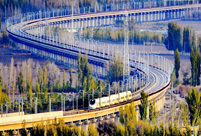

GUANGZHOU, March 1 (Xinhua) -- In Dongguan City, a dark, cobweb-filled workshop shows no signs of the activity it saw a year ago, when 650 workers polished mobile phone cases moving along 10 conveyor belts.
Today, the tasks are performed in the room next door by 60 robot arms. The mechanical limbs produce fewer duds and never get bored. Only 30 employees are needed to supervise the machines.
It was the first step for Everwin Precision Technology, which owns the plant, in replacing workers with machines, said company chairman Chen Qixing. The company aims to use 1,000 robotic arms to automate 80 percent of its manufacturing by 2017.
Everwin is among more than 1,000 manufacturers that have adopted automated helpers to reduce their heavy reliance on labor in Dongguan, a leading production base for garments and gadgets. The southern Chinese city in Guangdong Province has been called the"world's factory" and is a barometer for the country's economic changes.
China is the world's largest market for industrial robots, accounting for a quarter of global sales, according to the International Federation of Robotics.
The move toward automation has seen a major government push. Intelligent manufacturing is the core of the country's "Made in China 2025" plan to upgrade industry, and robotics is also mentioned in the country's new five-year plan, which will guide national economic development for 2016-2020.
CHEAPER, BETTER
A government work report delivered to local legislators in late February said Dongguan aims to become a trailblazer of China's robotics industry and an advanced manufacturing base with global clout.
Since the 1980s, the city has become a center for contract manufacturing, churning out toys, clothing and electronics for overseas brands. However, it bore the brunt of the 2008 global financial crisis due to weakening competitiveness resulting from dependence on cheap labor and a lack of research and development.
In September 2014, pressured by a persistent labor crunch and surging wage bills, Dongguan started its push into automation, providing subsidies for manufacturers' "machine for man" programs.
Manufacturers are facing a shortage of 200,000 workers, even though the city's minimum salary doubled between 2010 and 2015.
Nationwide, the labor pool is shrinking. The working-age population between ages 16 and 59 was 4.87 million less in 2015 than the previous year, marking a drop for the fourth straight year, according to the National Bureau of Statistics. Former head of the bureau Ma Jiantang said the declining trend will continue until 2030.
In addition to saving on costs, automation is also crucial to boosting accuracy and quality, Chen said. The "new hands" have brought down the proportion of substandard products to 5 percent from 25 percent and more than doubled productivity, he said.
As of January, 1,032 Dongguan companies applied for government subsidies for industrial automation, while shouldering more than 10 billion yuan (about 1.53 billion U.S. dollars) for their automation programs, according to the city's economic and information technology bureau.
The manufacturers saw productivity up by 65 percent and costs down by about 10 percent on average, and their work force is expected to be trimmed by more than 71,000, said Liu Yuqing, the bureau's chief economist.
Increased automation helps relieve workers of repetitive, dangerous and onerous tasks, said the city's Party chief, Xu Jianhua.
The drive has buoyed the robotics industry in Dongguan. Last year, about 400 companies producing robots, with more than 55,000 employees, achieved output of 26 billion yuan. The number is expected to quadruple by 2020, a goal set in a directive issued by the local government to bolster the industry in January.
The document also announced measures to fund automation of cost-sensitive small and medium-sized manufacturers. The city wants80 percent of its manufacturers to automate factory work by the end of 2018.
JOB KILLERS?
As workshops fill with robots, concerns have mounted about a shortage or jobs for humans. But in Dongguan, workers are safe for now.
A survey of manufacturers that have switched to automation showed that only about 20 percent of them resorted to layoffs, while some of the remaining have even hired more workers, said vice mayor He Yu.
Laid-off workers can easily find new jobs in other factories or the service sector, as job seekers in Dongguan get 1.2 offers on average, He said.
However, a sense of insecurity has grown among workers. In the past, many were spoiled by increasingly generous pay due to the labor shortage, and workers neglected to update their skills.
Chen Haibo, 28, is grateful that he secured a spot at an automation training program in early 2014. "I had three rounds of interviews. If I had not made it, I'm afraid I would be transporting bricks at a construction site right now," said the automation specialist at a Taiwan-invested plant.
The robot rivals have brought other changes to Dongguan's work force. Statistics from the city's employment authorities showed that the number of young and middle-aged workers last year saw an increase of 2.3 percent from 2014.
Among them, the number of those with a high school or higher education diploma was up 2 percent year-on-year, and the number of those with a vocational certificate was up nearly 10 percent.
Some manufacturers hope that industrial automation will help improve workers' abilities. "We're not talking about driving workers away. Our goal is to enable our staff to achieve higher efficiency with the assistance of robots," said Yuan Xiongbin, deputy general manager of Dongguan CAIC Winnerway Automobile Company.
The automaker has automated its production lines to support a3.5-billion-yuan new energy vehicle program. It required the equipment supplier to offer training for all its employees.
Economics professor Luo Mingzhong said although automated manufacturing seems a distant worry for workers, given the labor shortage, training of workers deserves more attention because it can help maintain a stable job market and accelerate China's economic restructuring.
 China has world's largest high-speed rail network
China has world's largest high-speed rail network Top beauties in Chinese provinces
Top beauties in Chinese provinces 600 people attend Lusheng playing contest in S China
600 people attend Lusheng playing contest in S China Engineer troop builds bridge in real combat conditions
Engineer troop builds bridge in real combat conditions You can urinate in public in Chongqing
You can urinate in public in Chongqing Rice terrace scenery in southwest China's Yunnan
Rice terrace scenery in southwest China's Yunnan 2016 Miss Chinatown USA pageant held in San Francisco
2016 Miss Chinatown USA pageant held in San Francisco Ancient pagodas across China
Ancient pagodas across China Wedding dress show up in the air
Wedding dress show up in the air Top 20 hottest women in the world in 2014
Top 20 hottest women in the world in 2014 Top 10 hardest languages to learn
Top 10 hardest languages to learn 10 Chinese female stars with most beautiful faces
10 Chinese female stars with most beautiful faces China’s Top 10 Unique Bridges, Highways and Roads
China’s Top 10 Unique Bridges, Highways and Roads Culture shock for pets
Culture shock for pets Open Internet must be controllable
Open Internet must be controllable Grown-up children of migrant workers more likely to be jailed
Grown-up children of migrant workers more likely to be jailed Smooth sailing for cruise market as passengers pass 1m mark
Smooth sailing for cruise market as passengers pass 1m markDay|Week